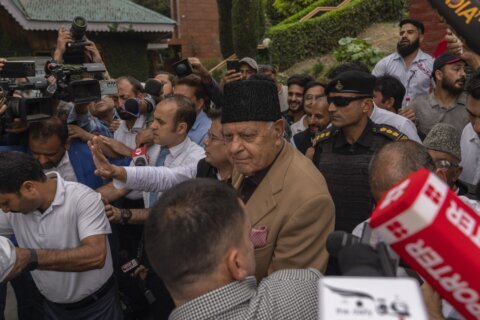Last month, the president of Uganda called on leaders of East African Community (EAC) countries to convene to forge a common position on the situation in Ethiopia. The summit is a critical one: with 2 million displaced in just a year, and 400, 000 now living in famine, Ethiopia’s civil war is on track to surpass Yemen’s for the grim title of world’s worst humanitarian crisis.
Washington already is involved. In the run-up to his first visit to sub-Saharan Africa last month, U.S. Secretary of State Antony Blinken expressed his concern over the worsening situation in Ethiopia, and threatened sanctions should peace talks not progress — on both the government and the Tigrayan rebels seeking to overthrow them.
Many are likely to welcome his intervention. But it casts a familiar shadow over the upcoming summit, the very purpose of which is to find an African-led path to peace. The past 20 years have seen African nations fighting ever more determinedly to take the role of policeman for our own neighborhood. And we are succeeding: Over that same period, instability across the continent has halved. But when our wealthier and more developed allies in the West — however well-meaning — hijack our leaders’ efforts, they undermine them. They remove our agency to solve our own problems. They hamper our efforts to democratize and grow more self-reliant.
[READ: The 10 Countries That Care the Most About Human Rights, Based on Perception]
This is why the EAC summit matters. It is a platform established for African leaders to find an African solution to an African problem. We seek to lead because, ultimately, African nations must be the first and final arbiters of peace on our own continent. When we are given the space to do so, the results are plain to see.
Look to my home country of Uganda, mere decades ago one of the leading sources of instability across the continent. Today, we are the primary guarantor of security and peacekeeping across the region, spearheading regional and pan-African peacekeeping missions and frequently turned to by our neighbors for support on security issues.
And look at the institutions that can be built when African nations come together. The eight-country African trade bloc, the Intergovernmental Authority on Development (IGAD), has proven a diplomatic as well as economic force, instrumental in the South Sudan peace progress, to give but one example. The African Court of Justice and Human Rights, the primary judicial agency of the African Union is able to review the most serious of crimes, from war crimes to terrorism, with a pan-African support not enjoyed by other international organs such as the ICC.
Nevertheless, it would be easy to acquiesce to those who conclude the United States, United Kingdom, or the Europeans must somehow step into the Ethiopian crisis. That this civil conflict now threatens the capital, Addis Ababa, also a city of the African Union — the symbol of continental unity — is not lost on us. Nor is it that this year in Guinea, Niger, Mali and Sudan the number of governments overthrown matches the average of four a year between 1956-2001 — when there were 80 successful and 108 failed African coup attempts.
Yet when we see similar instability in Europe from Belarus to Bosnia it is certain no part of the world is immune. Unrest can affect any country at any time. Not long after Uganda called the summit, in Kampala — the capital of Africa’s security hub — two terrorist incendiary devices killed three people and wounded more. But just as Uganda has led the fight against terrorism in Somalia and elsewhere, it must be able to do so within its own borders on its own terms. Then the summit, for now postponed, can take place.
What we see today, in Ethiopia and elsewhere is, in part, the economic torment caused by 18 months of COVID lockdowns breaking governance in four of the continent’s most fragile states. The events in Ethiopia seem different, but they have a similar root cause: the lack of accountability and representation in governance for different groups and centers of power.
It is true that the situation in Ethiopia has implications that go beyond the borders of Africa. The U.S. and others must have their say — indeed, we welcome it. But Ethiopia’s war is an African crisis. African nations must lead the efforts to tackle it.
More from U.S. News
How Climate Change May Increase Global Conflicts
The 10 Countries That Care the Most About Human Rights, Based on Perception
The 25 Best Countries in the World
African Leaders Must Take the Lead on an African Crisis originally appeared on usnews.com







